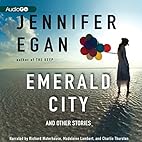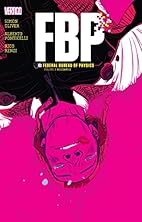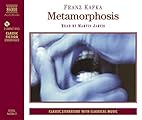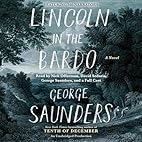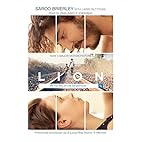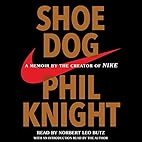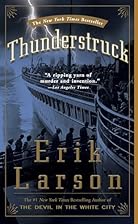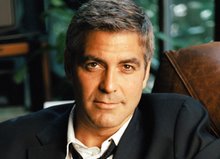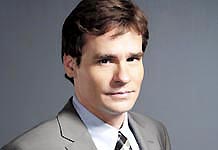I feel I was all over the place in my January reading. Paper books are taking me longer and longer to read, yet I can zip through an audiobook in a few days. I realized in my end of the year recap that I hadn't read many/any short story collections, and I usually enjoy short stories. Somewhere, once upon a time, I marked some books at Goodreads from a list of connected short story collections, so I hope to find some of those this year.
Emerald City by Jennifer Egan is not one of those books. I don't think. But some of the stories have the same type of characters (con men, models, daughters of adulterers) enough that made me question whether they were the same characters. None of the stories are happy, everyone has something to hide or reveal. I like short stories that are a little diabolical.
(5h 32 min, narrated by Richard Waterhouse, Madeleine Lambert, Charlie Thurston)
A couple of graphic novels series I have been following are the Lumberjanes and FBP (Federal Bureau of Physics)
FBP Vol 3: Standing on Shoulders by Simon Oliver is a science fiction world where something is happening on earth that defies the laws of physics and the FBP investigators. The series is only four long I believe, so I'm getting near the end. Each so far, besides detailing some of these black hole/dark energy issues, backstories the main investigators. Now that all of them have been thoroughly introduced, the final edition should be a doozy.
The Lumberjanes Vol 6: Sink or Swim by Shannon Watters was, as usual, excellent. I've got Volume 7 out from the library, so will review them together next month.
There are some classic novels I have no interest in reading, like The House of the Seven Gables, or Ulysses by James Joyce and there are some that seem intriguing (and short. That helps.) Metamorphosis by Franz Kafka is one of those classics that seems worth reading. I was pleased that it ended up being a free YA Sync book last summer. It was readable, and a guy actually woke up turned into a giant bug. His family has to figure out what to do with him. It's the kind of book that makes me go look up Sparknotes to find out about themes and motifs and such.
(2h 12 min, narrated by Martin Jarvis)
While I'm getting better, I still get pulled in by books that win awards or get lots of praise. There has to be more than just prize-winning (in this case, Booker Prize) to make me get it. I've read George Saunders' short story collection, Tenth of December so was predisposed to like him. Then, Lincoln in the Bardo was selected as one of the Tournament of Books. The cast of narrators is much too large to name, and it's more of a cast recording, so I chose to listen to it.
Ghosts surrounding Abraham Lincoln's son after he died tell lots of stories. Distractingly, real quotes about the person or event are included. I had to look up "op. cit." which was just a bibliographic reference to a book that had been previously quoted. I actually think the paper edition might have been better for me as I didn't recognize hardly any of the famous voices, and all the real quotes didn't help my listening. Parts dragged, but parts were humourous and interesting. Overall, Saunders created a unique style to tell a story, and for those interested in American History. I can see why it won the Booker Prize.
And finally, two books to round it out will get their own reviews later.
The Dud: The 100-Year-Old Man Who Climbed Out the Window and Disappeared by Jonas Jonasson and
The Best: Eleanor Oliphant is Completely Fine by Gail Honeyman (audiobook)
Monday, February 5, 2018
Sunday, February 4, 2018
UPDATE: January Nonfiction Reads
Still keeping a good percentage of nonfiction books into 2018. A couple of perfectly fine memoirs that were engaging and entertaining and made me look up information as I read.
Lion by Saroo Brierly, which the movie was based on covers a little boy who gets majorly lost in India, and eventually adopted in Australia. He uses what little he remembers to eventually search for his family in India. So many good people in this one, very hopeful and the author maintained such a good approach to life even after surviving as a five year old on the streets of Calcutta.
(7 h 29 min, narrated Larry Buttrose)
Similar to Shoe Dog by Phil Knight, the story of Nike. It's hard to believe that Nike was once considered an underdog. A tad too much business information and money battles, but it was fascinating to see how an empire was built based on a few guys and a dream. I remember when the waffle sole sneaker came out in the late 70s. The afterward addresses somewhat the sweatshop factories in Asia.
(13 h 22 min, narrated by Norbert Leo Butz)
Two books were carry overs from 2017, and still took a long time to finish.
Hidden Life of Trees: What They Feel, How They Communicate - Discoveries from a Secret World by Peter Wohlleben was okay. Wohlleben's love of trees was clear, but the anthromorphication of their behaviour was a stretch for me. (They feel pain? They send messages? Not buying it. All I could think was what will the vegans eat?) I felt like I had read some of this before; maybe from Lab Girl? I guess it mainly felt too long, and repetitive. I get it, trees are amazing.
(288 pages, library)
Thunderstruck by Erik Larson also needed a bit of editing. I got it for the Marconi/radio story but it bored me far more than it should have. Larson does impeccable research and seems to not want to leave out any minor fact after learning it. The parallel story, about a murder in London was much more interesting. I could not figure out why the stories were paired, but once I realized (far too late - editing!) it was a very good pay-off.
Poor Erik Larson - the first book I read was by far his best (Devil in the White City) and each time I read another one of his, (Dead Wake, In the Garden of the Beasts) am slightly disappointed.
(480 pages, own book)
My final nonfiction was Hunger: A Memoir of (My) Body by Roxane Gay, a real gut-wrencher. Gay writes heart-breakingly about when she was raped as a teenager, and the subsequent weight gain, so she could feel unapproachable to men. She is brutally honest and it was a difficult read, but seeing inside someone's head is always an aware-making experience. The stream of consciousness style led to, for me, some contradictions. Is everyone looking at you and judging you, or are you invisible and not paid attention? Clearly can be both on different days but still felt weird. I will read more Gay.
(320 pages, read on e-book)
Subscribe to:
Comments (Atom)
